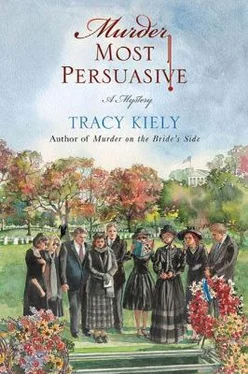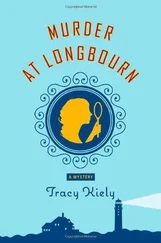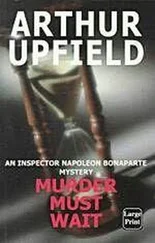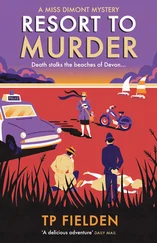Tracy Kiely
Murder Most Persuasive
For Jack, Elizabeth, and Pat—much love, Mom
I’d like to thank Barbara Kiely, Ann Mahoney, Sophie Littlefield, MaryAnn Kingsley, and the BUNCO ladies for their continued friendship and support. A big thank-you to Terry Mullen-Sweeney for her early read and edits (we’ll always have Paris and Gavi di Gavi!). Bridget Kiely was once again an invaluable source for Janeite inspiration and snarky humor. Barbara Poelle made the whole dream happen (again) and talked me down from the ledge of fear several times. Toni Plummer’s suggestions were wonderful, and Cynthia Merman deserves the editing gold star (plus an all-inclusive two-week vacation). My husband, Matt, should win the award for Most Cheerful Viewings of Austen, and my children, Jack, Elizabeth, and Pat, were once again lovely and supportive throughout it all.
Unfortunately … there are so many who forget to think seriously till it is almost too late.
—Persuasion
Martin Reynolds’s death came as a surprise to no one. No one, that is, except his wife, Bonnie. It was the final and most telling example of the total lack of communication that existed in their marriage. The fact that the cancer he’d battled for years proved more than his weakened seventy-seven-year-old body could handle somehow managed to escape Bonnie entirely. But to be fair, most things escaped Bonnie entirely.
“My poor, poor Marty!” Bonnie now murmured with a mournful shake of her blond head. “How could this have happened?” No one responded. The funeral services had been held at ten in the morning, after which the family had escorted Martin’s remains to Arlington Cemetery where, as a former naval officer, he was granted a burial spot. It was now one in the afternoon. By my modest count, Bonnie had uttered this same question some eighty-seven times since the day began. After about the sixty-fifth utterance, most of the family had stopped trying to console her, as our words of sympathy fell on deaf ears. By the seventy-second time, even the nicest among us had fallen silent. Now, unfortunately, her rhetorical murmurings were prompting unabashed eye rolling from the more callous attendees.
“Stop that!” I hissed at my aunt Winnie, whose orbs now seemed in danger of disappearing completely into her skull.
“Oh, please,” she retorted with a toss of her head. The small movement sent her bright red curls quivering. “This is nothing more than standard Bonnie drama.”
She was right, of course, and as Martin’s younger sister, Aunt Winnie had had a front-row seat for several of Bonnie’s performances over the years. “Besides,” Aunt Winnie continued, “you know how I hate artifice of any kind.”
I rolled my own eyes at this and glanced meaningfully at Aunt Winnie’s trademark curls, which, if anything, had only grown redder during her seventy-odd years. Curving her equally red lips into a warning smile, Aunt Winnie murmured, “Don’t be a smart-ass, Elizabeth.”
“Me? Perish the thought. I didn’t say a word.”
“No. But you were thinking it.”
“True.”
“Careful,” she said meaningfully, “or I’ll tell your mother.”
“Tell her what?” I inquired after a moment’s pause.
Aunt Winnie opened her green eyes very wide and leaned in close. “Do you really need me to catalog all the dirt I have on you?” she asked good-naturedly.
Aunt Winnie is my great-aunt on my mother’s side. More important, she has been my confidante ever since I was twelve years old and she bagged me trying to stuff my pathetically empty bra with toilet paper. I’m now twenty-eight. While I no longer stuff my bra—more due to a resignation to certain facts than because of any major developments in that area—Aunt Winnie still has enough dirt on me to start a landfill. I sat back in my chair, an exaggeratedly polite expression on my face. “Blackmailer,” I hissed.
She gave a firm nod of her head. “Damn skippy.”
Seated opposite me, my mother kicked my leg under the table while sending me a reproachful look across it. Next to her, my older sister, Kit, eyed me with the slightly superior expression she generally adopts whenever she perceives that I have stepped out of line. While I’ve never actually caught her, I suspect she practices it in the mirror. Not that she needs much practicing. Kit has those angelic features that lend themselves perfectly to holier-than-thou looks. She inherited my mom’s straight blond hair. I had ended up with my dad’s curly brown hair, which looks just fine cut short and close to the head; grow it shoulder length and that’s a whole other story. Add to that large blue eyes, perpetually clear skin, and a smirking mouth, and Kit looks like a smug Botticelli angel. I, on the other hand, have green eyes and freckles. Throw in the aforementioned chest issue and I’m more likely to be compared to Botticelli’s Portrait of a Young Man .
While I restrained myself from sneering at Kit, Aunt Winnie sent me a sly wink before demurely ducking her bright red head into a position of quiet respect.
Forcing myself not to roll my own eyes, I focused my attention on Bonnie just in time to hear her murmur again, “Poor, poor Marty! I just don’t see how this could have happened!”
Bonnie was Martin’s second wife. His first wife, Rose, died some twenty-five years earlier, leaving Martin in the unenviable position of sole parent to three young daughters. Although a savvy businessman who had built a family construction company into a national business, Martin was no match for the demands of parenthood and he knew it. Using the same cool determination he employed to build his multimillion-dollar business, he set out to remedy the situation the only way he knew how—by remarrying. Of course it helped that he was both very rich and very handsome. Within two years, Bonnie McClay, a naïve thirty-five-year-old secretary employed in the head office, was tapped for the role. It was one of only a handful of times where Martin’s legendary acumen failed him, as Bonnie was even more helpless about children than Martin. Within three months, the children had dubbed their stepmother “McClueless” and commenced an unspoken war of resistance against her. Looking around me now, it appeared that the war still raged today.
We were sitting at a long table in the Hotel Washington’s elegant Sky Terrace restaurant. Located on the hotel’s rooftop, it afforded a spectacular view of Washington, D.C. The first strokes of autumn’s vibrant hand were apparent in the nation’s capital and the city was awash in color. A mosaic of purple, yellow, and red foliage reflected in the rippling waters of the Tidal Basin. Flora in riotous golden hues bloomed along the perfectly groomed grounds of the monuments. The monuments themselves stood tall and proud, the timeless lines of their crisp, white façades majestic against the clear indigo sky.
As glorious as the view was, it couldn’t hold a candle to the scene that was playing out around me. Clutching a lacy black handkerchief and gently dabbing it to her teary sapphire eyes, Bonnie sat like a Victorian queen in mourning. Swathed from head to toe in black, her outfit was faintly reminiscent of Scarlett O’Hara’s garb in Gone with the Wind, the one she wears after her first husband, Charles, dies. In fact, I thought, as I peered closer at the dark, flowing dress, I wouldn’t be at all surprised if it were an updated copy. Given Bonnie’s flair for the dramatic, as well as her love of Margaret Mitchell’s epic classic, it would be entirely within her dingbat character. (Bonnie was not only named for Scarlett’s daughter, Bonnie Blue, but also had an annoying tendency to quote Scarlett’s lines from both the book and the movie. A lot.)
Читать дальше












